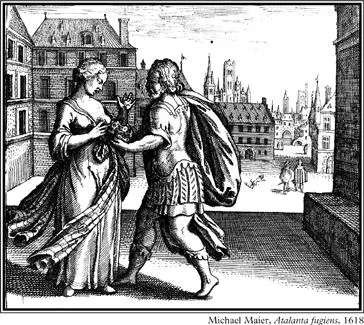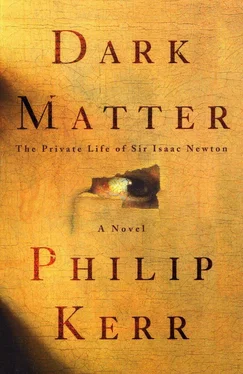“It is well known at the Whit, the pressure you’re liable to put a man under, to peach. Mister Scroope feared you very much, Doctor Newton, especially after you got on the trail of Daniel Mercer, and John Berningham, for they could have told you everything about our operation that you would have wished to know. In short, that we were forging golden guineas and exporting silver bullion to advantage the cause of King Lewis of France in particular, and Roman Catholicism in general. It was certain that Mercer and Berningham had to be silenced, which meant that your own spy had to die as well, for he was watching Mercer. I just hit him over the head, trussed him up, and then introduced him to the lions, so to speak.
“That part was all Mister Scroope’s idea. For he wished to divert you with a matter most intriguing to your fancy, sir. He said you were most interested in alchemy and that we would make it look as though it had been certain philosophers that had done the killing. But also that we should use a most secret cipher he knew with which to tickle you even more.”
“But how did you come and go in the Tower with such facility?” asked Newton.
“That was easy. The first time we entered the Tower as two night-soil collectors. The sentry gave us a wide berth, for no one likes to get too close to the shite men. And while Mister Scroope distracted him with an enquiry, I lifted the key to the Lion Tower with a filch. We knew where it was because I drank with the keeper, and he told me. Your spy was already trussed up and waiting most patiently in Mister Scroope’s carriage out on Tower Hill.
“The second time, we was delivering a cartload of hay. I killed Mercer in our own workshop and then put him in the cart while Mister Scroope went to Mercer’s lodgings to leave some other diversions there for you. Then we drove to the Tower, put down the body, ordered the scene as you found it, left the hay, and then drove away.”
“What about the book in the Tower library?” asked Newton. “Did Mister Scroope leave that there for me too?”
“Yes sir, that he did.”
“I should like to know more about Mrs. Berningham,” I asked Robles.
“She and Scroope were lovers, sir,” said Robles. “She was a ruthless one, though. Poisoned her husband at Scroope’s prompting her to do it, without a second thought.”
Robles paused for a moment as he coughed a great deal; and still thinking himself dying, he said, “And there’s a clean breast of it, sir. I ain’t sorry to have it off my conscience.”
For myself, I was sorry the poor wretch did not die then and there, as three months later Robles was dragged to Tyburn on a hurdle, where he met his death on his way to becoming one of London’s grisly overseers, for his head was displayed in a place where he could see all of London.
Robles’s death was cruel enough; but it did not compare to the fate that awaited Mrs. Berningham the following day.
She was conducted from the door of Newgate and, after a cup of brandy from the bellman at St. Sepulchre’s, was led through an enormous crowd that had gathered, to a stake in the middle of the street. There she was made to stand upon a stool while a noose was placed about her neck and attached to an iron ring at the top of the stake. The stool was then kicked away, and while she was still alive, two cartloads of faggots were heaped around her and set alight. And after the fire had consumed her body, the mob amused itself with kicking through her ashes. Both Newton and I attended her execution, although I think there is something inhuman in burning to death a woman who, by being the weaker body, is more liable to error and therefore more entitled to leniency. A woman is still a woman however she may have debased herself.
JESUS SAID TO THEM: “WHOEVER HAS EARS, LET HIM HEAR. THERE IS LIGHT WITHIN A MAN OF LIGHT, AND HE LIGHTS UP THE WHOLE WORLD. IF HE DOES NOT SHINE, HE IS DARKNESS.”
(THE GOSPEL OF THOMAS, 24)

Michael Maier, Atalanta fugiens , 1618
Newton had solved the mystery of only two of the murders that were committed in the Tower by St. Léger Scroope and his accomplice and servant Robles; the unravelling of the mystery of the two other murders, and the great secret which they were intended to protect, still lay ahead of us. Now it must be explained what happened after Scroope’s house burned down, and how Newton faced the greatest hazard to his person and detriment to his reputation since ever he had been born, for this university of London called Life provides its students with a more termagant variety of education than anything that is to be found at the Cambridge schools.
The day after Mrs. Berningham’s execution, I arrived at the office to discover Newton sitting in his chair by the hearth with the air of a man most discountenanced. That he ignored my greeting to him was hardly remarkable, and in truth I was used to his ponderous silences which were sometimes very weighty indeed; but that he should have ignored Melchior’s importunate suit for his attentions was strange indeed, so that gradually I saw how his black demeanour imitated Atlas with the vault of the sky upon his broad shoulders. Having questioned Newton several times, like Heracles, and even laid hold of his arm — for it was rare that I ever touched him, he being so shy of any physical contact — I saw how the matter seemed referable to a paper he held crushed within his fist.
At first I thought the paper was something to do with the code he still laboured hard to decipher. Had not Doctor Wallis warned him about racking his brains too much in search of the solution? And it was only when a closer inspection of his person revealed the shard of an official seal upon his breeches that I understood how the paper was nothing to do with the cipher at all, but rather some kind of official letter. Having questioned my master about its contents and still received no reply, not even a movement of his usually keen eye to make me keep my distance, I took the liberty of removing the letter from his rigorous grasp and perusing the contents.
What I read was most vexatious, and it was suddenly obvious to me why Newton gave the appearance of one who had received some kind of insult to his brain — even, perhaps, some kind of paralytic stroke. For the letter was from the Lords Justices inviting Newton to appear before them next morning in an informal and unrecorded private session, in order that he should answer affidavits viva voce that he was not a fit and proper person to hold government office, being of an anti-Trinitarian, Socinian, or Unitarian and therefore heretic disposition of mind most offensive to the King and the Church of England.
This was a grave matter indeed, for while I did not think that Their Lordships would have ordered Newton put to death, they might easily have sent him to the pillory, which would have amounted to the same thing, for, as I have explained, Newton was not loved by London’s population, because of his diligent pursuit of coiners; and there were many pilloried who, pelted by the mob with brickbats and stones, did not survive the experience. Indeed, there were not a few prisoners who feared the pillory more than fines and imprisonment.
My first inclination was to fetch a physician straightaway so that some kind of cure might urgently be effected, enabling him to appear before Their Lordships and give a good account of himself. But gradually I saw how summoning a physician would only have served to create abroad some gossip about the state of Newton’s mind. If he had suffered a stroke, then Newton was beyond any physician, to say nothing of Their Lordships. But if, as I hoped, the condition was merely temporary then he would not have thanked me for bringing a physician into his affairs. Newton disliked physicians at the best of times, preferring to treat himself on the very few occasions when he was ever ill. Besides, I knew he had suffered some previous breakdown, and from which he had, by his own account, recovered; and therefore I was encouraged to believe that my course of action was the correct one. So I fetched pillows and blankets from the Warden’s house and, having made him as comfortable as I could, went to see if Newton’s coachman still attended his master.
Читать дальше













